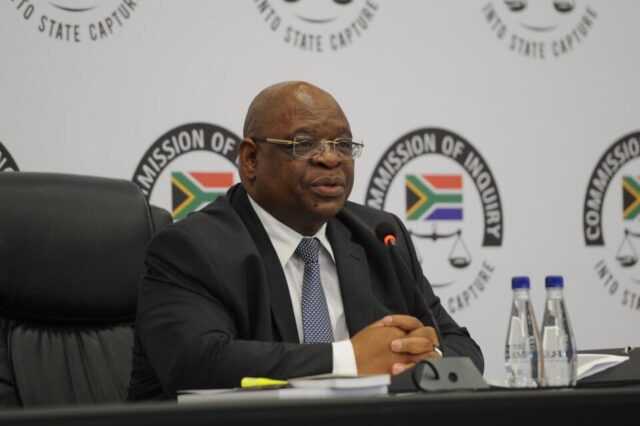Chief Justice Raymond Zondo has urged businesses to establish a fund to protect and incentivise whistle-blowers, pledging to contribute from his own finances if the fund comes to fruition.
CHIEF Justice Raymond Zondo has urged businesses to establish a fund to protect and incentivise whistle-blowers, pledging to contribute from his own finances if the fund comes to fruition.
At the launch of the anti-corruption working guide for South African companies in Sandton on Tuesday evening, Justice Zondo reiterated to the private sector some of the recommendations from his state capture report, delivered to President Cyril Ramaphosa a year ago, that the establishment of the fund would go a long way in assuring existing and potential whistle-blowers to report acts of corruption.
“If such a fund came to be established and contributions were required, I would make a contribution from my own resources. The fund would take care of the difficulties whistle-blowers face. Some of them were dismissed from their work, others found difficulty in finding employment because companies fear that they would do the same in their employ. We should start with those we already know of, who have come forward, some of them to the state capture commission,” he said.
Justice Zondo also called for the establishment of a public sector procurement agency that would monitor the purchase of goods by government agencies and would have the authority to randomly scrutinise the purchase of goods and services by the government.
“Such a unit would be like traffic police who will randomly scrutinise documents to see if processes are followed. I hope in due course there will be such a body.”
He also called for a standing permanent commission that would publicly call into account politicians and bureaucrats so the entire nation would know there was accountability as the state capture years had shown Parliament’s inadequacy in exercising oversight.
“Parliament had failed to stop state capture when they could have. To ensure that this does not happen again, the commission recommended that a standing commission be established,” he said.
The guidelines for an anti-corruption working guide for South African companies have been established by the private sector post the state capture report to draw frameworks for companies to be more ethical in their dealings and also set out to make an anti-corruption programme that may answer the questions of what should be done, how far it would go, who should have oversight responsibility and how to incorporate existing compliance functions such as internal audits and whistle-blowing programmes.
It has been crafted by a myriad companies in the business sector, including the Centre for Business Ethics at the Gordon Institute of Business Science, Business Leadership South Africa (BLSA), Business Unity South Africa (Busa), and Business for South Africa (B4SA), among others.
It comes in the wake of the state capture report and corruption incidents in which companies like EOH, Bosasa, KPMG, Bain, McKinsey and state enterprises including SAA have in recent times been flayed.
“The business case for doing this now is inarguable and pressing. As one study found, companies with dedicated anti-corruption and strong ethical guidelines, as we suggest, are found to suffer up to 50% fewer incidents of corruption than those without such programmes,” in part read the executive summary of the guide.
It is also taking a deep look into what action needs to be taken against companies who are caught in corruption, with varying interpretations that business itself is not inherently corrupt but that people promulgated unethical behaviour.
At a panel discussion “Fighting Corruption: From Impotence and Frustration to Agency and Action”, comprising Sibanye-Stillwater CEO Neal Froneman, BLSA CEO Busisiwe Mavuso, B4SA executive chairperson Martin Kingston and PwC CEO Dion Shango, it was revealed that private business had empowered the National Prosecuting Authority (NPA) with R20 million to help prosecute effectively.
Mavuso said the SAPS had been gifted technology in 200 police cars so far to help with surveillance work, including detecting stolen vehicles right along the roads.
“So far eight vehicles have been identified and 10 suspects arrested. We are looking at rolling this out on an even larger scale,” Mavuso said.
Shango said the issue of state capture was far too complex for any one sector in society to address it and needed a collective effort to change the culture and tone of business ethics.
– BUSINESS REPORT








